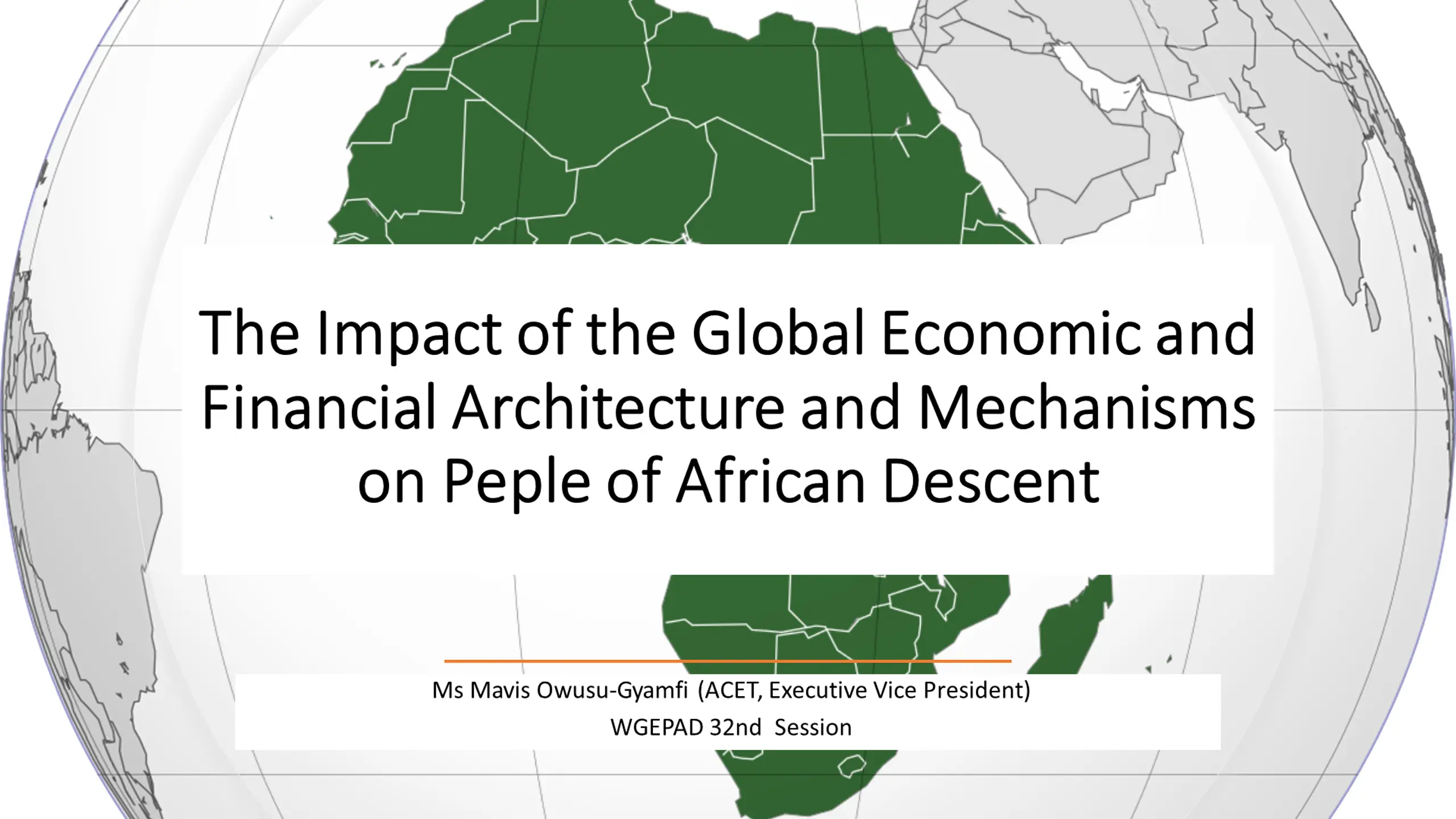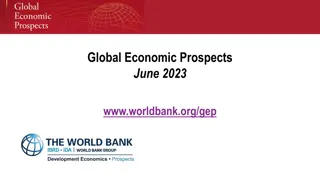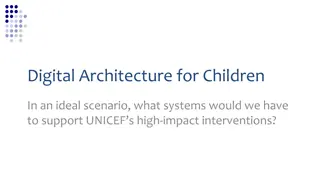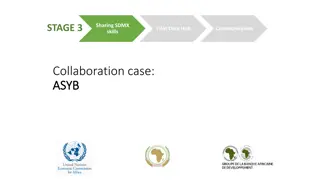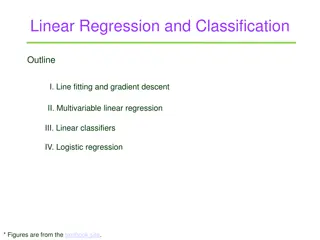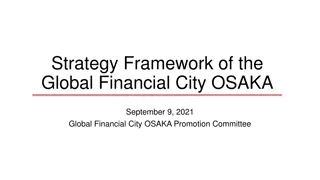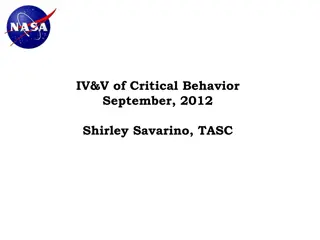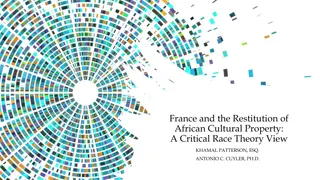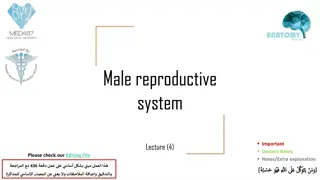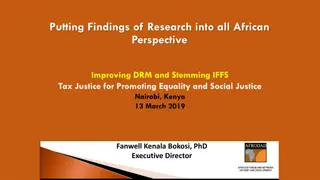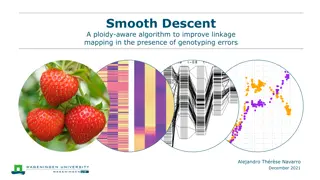The Impact of Global Economic and Financial Architecture on People of African Descent
The positive impact of global economic and financial architecture on people of African descent in Africa, the Caribbean, Europe, and North America. It discusses financing needs, debt challenges, sources of finance, climate finance, and the issue of racial discrimination in financial markets.
Download Presentation

Please find below an Image/Link to download the presentation.
The content on the website is provided AS IS for your information and personal use only. It may not be sold, licensed, or shared on other websites without obtaining consent from the author.If you encounter any issues during the download, it is possible that the publisher has removed the file from their server.
You are allowed to download the files provided on this website for personal or commercial use, subject to the condition that they are used lawfully. All files are the property of their respective owners.
The content on the website is provided AS IS for your information and personal use only. It may not be sold, licensed, or shared on other websites without obtaining consent from the author.
E N D
Presentation Transcript
The Impact of the Global Economic and The Impact of the Global Economic and Financial Architecture and Mechanisms Financial Architecture and Mechanisms on Peple of African Descent on Peple of African Descent Ms Mavis Owusu-Gyamfi (ACET, Executive Vice President) WGEPAD 32nd Session
Structure of Structure of Presentation Presentation The Positive Impact African Descendants in Africa African Descendants in the Caribbean African Descendants in Europe and North America Recommendations
Global Financial Architecture: The Positive Impact Global Financial Architecture: The Positive Impact Development Finance Life expectancy, literacy, health outcomes, and access to education over the past few decades Facilitated a supportive global environment - strong growth with trading partners, favorable global financial conditions, and growing exposure to a surging global economy. Significant financial support - grant, low interest debt, debt relief, concessional budget support etc Diversified sources of finance Help to mitigate the adverse effects of COVID-19 on developing countries: Debt Service Suspension Initiative (DSSI) IMF's Rapid Credit Facility Special Drawing Rights (SDR) Rapid disbursements of IDA and IBRD disbursements However, the multiple crises of Covid-19, Financial, Climate, Food Insecurity, Conflict etc. has shown it is has significant flaws and no longer fit for purpose especially for people of African Descent.
People of African Descent in Africa
Financing needs in Africa Achieving the SDGs SDG gains regressed during COVID, the continent needs an estimated estimated at between $614 - $638 billion annually to get back on track. Africa needs about $484 billion within the next three years to address the socio-economic impacts of the pandemic and support economic recovery alone (AFDB, 2022) continent's infrastructure financing gap is estimated to range from $68 billion to $108 billion per year. Debt in Africa Many African countries are facing increasing fiscal deficits and debt vulnerabilities, with some countries at risk of default. At least 48% of African countries have debt-to-GDP ratios above 70%.
Africa: Sources of Finance for Development Africa: Sources of Finance for Development Sources: Authors calculations based on data from IMF (2020a),World Economic Outlook (database) www.imf.org/external/pubs/ft/weo/2020/01/weodata/index.aspx; OECD-DAC (2020a),International DevelopmentStatistics(database) www.oecd.org/dac/stats/idsonline.htm; OECD-DAC (2020b),Country Programmable Aid (database) www.oecd.org/dac/financing-sustainable- development/development-finance-standards/cpa.htm; UNCTAD (2020a),World Investment Report 2020and World Bank (2020a),KNOMAD Remittances Data (database) www.knomad.org/data/remittances.
Global Finance Architecture: Africa Debt Grants & Investments Domestic Revenue Short Term Liquidity Special Drawing Rights Debt Suspension Initiative Grant Finance Bilateral Foundations Business Global Taxation Laws Capital Flight Foreign Direct Investment Development Finance Institutions Corporate Investors Private Investors Debt (Concessional and non- concessional) Multilateral Bilateral Bondholders domestic & international Other Short-term internal & external Global financial conditions, led by the US Federal Reserve Climate Finance Grants Equity Investments Inequality & Race
People of African Descent in Africa People of African Descent in the Caribbean and South America
In the Carribbean and South America Debt High Levels of Debt & Challenges with Debt Service Grant and Subsidized loans ODA has been on the decline as several SIDS graduated to LMIC status FDI FDI to Caribbean SIDS has been on the decline over the past decade
Financial support and exclusion Climate Finance Small Island developing states (SIDS), who are particularly vulnerable to extreme natural hazard shocks and climate change shave spent 18 times more in debt repayments than they receive in climate finance (Eurodad 2022). Financial exclusion in some countries: black and Afro-descendant communities face financial exclusion and limited access to credit and financial services in the region. For example, only 27% of black households in Brazil have access to formal credit, compared to 41% of white households.
People of African Descent in Europe & North America
Racial Discrimination in Europe and North America Wealth Gap Disproportionate negative impact on people of African. Systemic racism in financial markets limits access to credit and assets and has created a significant racial wealth gap. The wealth gap between American whites and Blacks is projected to cost the US economy between $1 trillion and $1.5 trillion in lost consumption and investment between 2019 and 2028. This translates to a projected GDP penalty of 4 to 6 percent in 2028 (Noel and others 2019). Racial discrimination: A barrier to economic and social progress for black and Afro-descendant communities
continued Displacement - Development projects that involve land acquisition or resource extraction often displaces people of African descent, from their homes and livelihoods. o Redlining in the US remains a silent discriminatory practice which banks and use to deny African American and the diaspora loans or other financial services based on perceived risk thereby depriving them of investment and economic development opportunities. o In cities across North America and Europe, gentrification more often than not displaces people of African descent o People of African descent in North America and Europe are often disproportionately affected by development finance policies that prioritize industrial and infrastructure development without adequate safeguards can exacerbate these disparities. For example, the Flint water crisis in Michigan, USA, disproportionately affected the city's majority African American population, many of whom were already poor. France s, GDP increase by 1.5 percent over the next 20 years ($3.6 billion) by reducing racial gaps in access to employment, work hours, and education (Bon- Maury and others 2016).
Increase the amount of low-interest money available to countries, and make sure it stays available over the long term. Re-channel IMF Special Drawing Rights (SDRs) to the African Development Bank. African Ministers of Finance: The Road to Marrakech Sustain the IMF s Poverty Reduction and Growth Trust with additional financing. Overhaul the Common Framework and find a real solution to the debt crisis. Confirm the African Union as a full member of the G20.
Way forwad: Bridgetown Initiative Expand multilateral lending to governments by US$1 trillion Increase official donor resources to multilateral institutions engaged in development banking Provide debt relief for highly indebted middle-income countries, including debt to MFIs, and establish responsible lending and borrowing rules to prevent debt- fueled capital flight. Development partners should collaborate with the private sector to create new and innovative financial instruments, like green bonds and debt-for-climate or debt-for-nature swaps that de-risk investments Barbados is calling for reform of financial institutions including the World Bank to help developing nations on the frontline of climate change. Image: World Bank
Additional Recommendations on a Way Forward Provide financial and technical support to enhance revenue generation and public spending efficiency Curtail capital flight by making it difficult for ruling elites to stash cash in Western havens and continue efforts to recover stolen assets. Leverage diaspora capital for development through better economic management, instilling confidence in political governance and social stability, and establishing National Development Trust Funds, Diaspora Bonds, Collective Remittances and Diaspora Philanthropy, Crowd Funding platforms, and Diaspora Direct Investment Support the establishment of independent and publicly owned CRAs to assess Africa's credit rating more fairly and transparently Prioritize the issue of reparations as one important step towards rectifying the historical injustice of slavery and addressing the resulting inequality and unfair treatment towards people of African descent
Create more equal societies For people of African descent in North America and Europe Ensure meaningful participation and engagement of communities in decision-making processes Support initiatives that promote economic empowerment and social inclusion of communities Support initiatives to address historical injustices and inequalities
